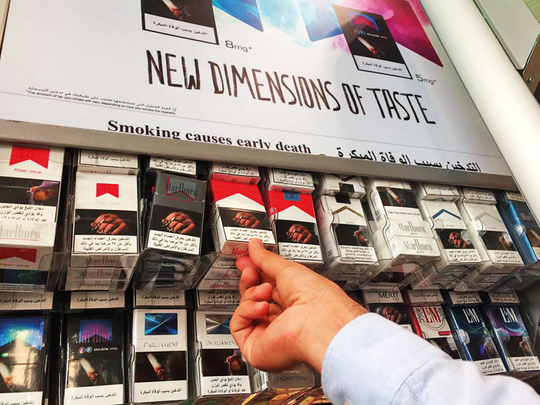
ISLAMABAD: The ruling Pakistan Tehreek-e-Insaf (PTI) government is mulling a new tax on the tobacco industry and sugary beverages. A meeting of the senior officials of the Tobacco Control Cell (TCC), Ministry of National Health Services (NHS), Economic Coordination Committee (ECC) and Federal Board of Revenue (FBR) is scheduled later this month or early February in this regard.
While talking to Gulf News, a senior official of the Ministry requesting anonymity on Sunday said the ministry is going to implement the idea of levying ‘sin tax’— Rs10 (Dh0.26) on each cigarette packet and Re1 on 250ml bottle of beverage — and modalities in this regard will be discussed in the upcoming meeting.
Health Minister Amir Kiani has appreciated this idea because according to a rough estimate, a revenue of around Rs60 billion is expected to be generated through the tax and the money raised will be spent on health insurance of the Pakistani people, an important point of the PTI-government’s manifesto, he said.
About the meeting that is scheduled for late January and early February the official said, it is in fact ‘pre-taxation’ meeting as each year the Health Ministry urges FBR and the Finance Ministry to raise taxes on tobacco industry and increase the prices of the cigarettes and other tobacco products.
This time, however, sugary beverages are also on the radar of the ministry.
In December 2018, a summary was also moved from NHR Ministry to the Economic Coordination Committee (ECC) advocating introduction of the new tax. According to the summary, “To discourage cigarettes smoking and use of sugary drinks (drinks with sugar including carbonated soft drinks, sport drinks and energy drinks), increasing revenues and saving money by reducing NCDs related health care costs, the ECC is requested to approve the imposition of sin tax on tobacco and sugary drinks proposed.”
The ECC is likely to take up the summary in its upcoming meeting.
In Pakistan, the tobacco industry is allegedly in connivance with top bureaucracy, and politicians keep influencing policymakers to never let the government and the FBR increase taxes on cigarettes beyond a certain limit.
The TCCat the NHS Ministry and the World Health Organisation (WHO) have been calling for a raise in taxes on tobacco but the nexus between the industry and the bureaucracy seldom lets any such effort be successful.
Shahzad Alam, the national programme officer of World Health Organisation (WHO), while talking to Gulf News said according to recent research, it has been estimated that in Pakistan alone 250,000 deaths occur annually due to tobacco-related diseases.
Unless we implement the Framework Convention on Tobacco Control in letter and spirit of which Pakistan is a signatory, there will be no improvement in situation and tobacco industry will keep targeting young customers, said Alam.
Dr Ziauddin, technical head of the TCC, NHS Ministry, was of the view that in the past, the tobacco industry was influencing the political leadership of the country, when it comes to tobacco pricing and taxation in the country.
He explained how tobacco industry in Pakistan was fervently targeting 13 to 17-year-old youths in Pakistan by placing cigarette advertisements around schools,












